
The following ballad, published in this translation in the Monthly Magazine of 1796, was originally written by Gottfried Bürger. It became very popular in England and influenced Romantic literature for years to come. The spelling and some of the words are deliberately archaic or old-fashioned, to make the ballad seem more “primitive” or traditional.
[The following translation (made some years since) of a celebrated piece, of which other versions have appeared, and are now on the point of appearance, possesses so much peculiar and intrinsic merit, that we are truly happy in being permitted to present it to our Readers.]
At break of day, with frightful dreams
Lenora struggled sore:
My William, art thou slaine, say’d she,
Or dost thou love no more?
He went abroade with Richard’s host,
The Paynim foes to quell;
But he no word to her had writt,
An he were sick or well.
With sowne of trump, and beat of drum,
His felow-soldyers come;
Their helmes bydeckt with oaken boughs,
They seeke their long’d-for home.
And ev’ry roade, an ev’ry lane
Was full of old and young,
To gaze at the rejoicing band,
To hail with gladsome toung.
“Thank God!” their wives and children saide,
“Welcome!” the brides did saye:
But greete or kiss Lenora gave
To none upon that daye.
She askte of all the passing traine,
For him she wisht to see:
But none of all the passing traine
Could tell if lived hee.
And when the soldyers all were bye,
She tore her raven haire,
And cast herself upon the growne
In furious despaire.
Her mother ran and lyfte her up,
And clasped in her arme,
“My child, my child, what dost thou ail?
God shield thy life from harm!”
“O mother, mother! William’s gone!
What’s all besyde to me?
There is no mercye, sure, above!
All, all were spar’d but hee!”
“Kneel downe, thy paternoster saye,
’Twill calm they troubled spright;
The Lord is wyse, the Lord is good;
What hee hath done is right.”
“O mother, mother! say not so;
Most cruel is my fate:
I prayde, and prayde; but watte avayl’d?
’Tis now, alas! Too late.”
“Our Heavenly Father, if we praye,
Will help a suff’ring childe:
Go take the holy sacrament;
So shall they grief grow milde.”
“O mother, what I feel within,
No sacrament can staye;
No sacrament can teche the dead
To bear the light of daye.”
“May be, among the heathen folk
Thy William false doth prove,
And puts away his faith and troth,
And takes another love.
Then wherefore sorrow for his loss?
Thy moans are all in vain:
And when his soul and body parte,
His falsehode brings him paine.”
“O mother, mother! Gone is gone:
My hope is all forlorn;
The grave mie onlye safeguarde is–
O, had I ne’er been borne!
Go out, go out, my lampe of life;
In grislie darkness die:
There is no mercye, sure, above!
For ever let me lie.”
“Almighty God! O do not judge
My poor unhappy childe;
She knows not what her lips pronounce,
Her anguish makes her wilde.
My girl, forget thine earthly woe,
And think on God and bliss;
For so, at least, shall not thy soule
Its heavenly bridegroom miss.”
“O mother, mother! what is blisse,
And what the fiend is celle?
With him ’tis heaven any where,
Without my William, helle.
"Go out, go out, my lamp of life;
In endless darkness die:
Without him I must loathe the earth,
Without him scorne the skye.”
And so despaire did rave and rage
Athwarte her boiling veins;
Against the Providence of God
She hurdle her impious strains.
She bet her breaste, and wrung her hands,
And rollde her tearlesse eye,
From rise of morne, till the pale stars
Again did freeke the skye.
When harke! abroade she hearde the trampe
Of nimble-hoofed steed;
She hearde a knighte with clank alighte,
And climb the staire in speede.
And soon she herde a tinkling hande,
That twirled at the pin;
And thro’ her door, that open’d not,
These words were breathed in.
“What ho! what ho! thy dore undoe;
Art watching or asleepe?
My love, dost yet remember mee,
And dost thou laugh or weep?”
“Ah! William here so late at night!
Oh! I have watche and wak’d:
Whence dost thou come? For thy return
My hearte has sorely ak’d.”
“At midnight only we may ride;
I come o’er land and sea:
I mounted late, but soone I go;
Aryse, and come with me.”
“O William, enter first my bowre,
And give me one embrace:
The blasts athwarte the hawthorne hiss;
Awayte a little space.”
“Tho’ blasts athwarte the hawthorn hiss,
I may not harboure here;
My spurre is sharpe, my courser pawes,
My houre of flighte is nere.
All as thou lyest upon thy couch,
Aryse, and mount behinde;
To-night we’le ride a thousand miles,
The bridal bed to finde.”
“How, ride to-night a thousand miles?
Thy love thou dost bemocke:
Eleven is the stroke that still
Rings on within the clocke.”
“Looke up; the moone is bright, and we
Outstride the earthlie men:
I’ll take thee to the bridal bed,
And night shall end but then.”
“And where is, then, thy house and home;
And where thy bridal bed?”
“Tis narrow, silent, chilly, dark;
Far hence I rest my head.”
“And is there any room for mee,
Wherein that I may creepe?”
“There room enough for thee and mee,
Wherein that we may sleepe.
All as thou ly’st upon thy couch,
Aryse, no longer stop;
The wedding guests thy coming waite,
The chamber dore is ope.”
All in her sarke, as there she lay,
Upon his horse she sprung;
And with her lilly hands so pale
About her William clung.
And hurry-skurry forth they go,
Unheeding wet or dry;
And horse and rider snort and blow,
And sparkling pebbles fly.
How swift the flood, the mead, the wood,
Aright, aleft, are gone!
The bridges thunder as they pass,
But earthly sowne is none.
Tramp, tramp, across the land they speede;
Splash, splash, across the see:
“hurrah! the dead can ride apace;
Dost feare to ride with mee?
The moone is bryghte, and blue the nyghte;
Dost quake the blast to stem?
Dost shudder, mayde, to seeke the dead?”
“No, no, but what of them?
How glumlie sownes yon dirgye song!
Night-ravens flappe the wing,
What knell doth slowlie toll ding-dong?
The psalmes of death who sing?
It creeps, the swarthie funeral traine,
The corse is onn the beere;
Like croke of todes from lonely moores,
The chaunte doth meet the eere.”
“Go, bear her corse when midnight’s past,
With song, and tear, and wayle;
I’ve gott my wife, I take her home,
My bowre of wedlocke hayl.
Lead forth, O clarke, the chaunting quire,
To swell our nuptial song:
Come, preaste, and reade the blessing soone;
For bed, for bed we long.”
They heede his calle, and husht the sowne;
The biere was seene no more;
And followde him ore feeld and flood
Yet faster than before.
Halloo! halloo! away they goe,
Unheeding wet or drye;
And horse and rider snort and blowe,
And sparkling pebbles flye.
How swifte the hill, how swifte the dale,
Aright, aleft, are gone!
By hedge and tree, by thorpe and towne,
They gallop, gallop on.
Tramp, tramp, across the land they speede;
Splash, splash, acrosse the see:
“Hurrah! the dead can ride apace;
Dost fear to ride with me?
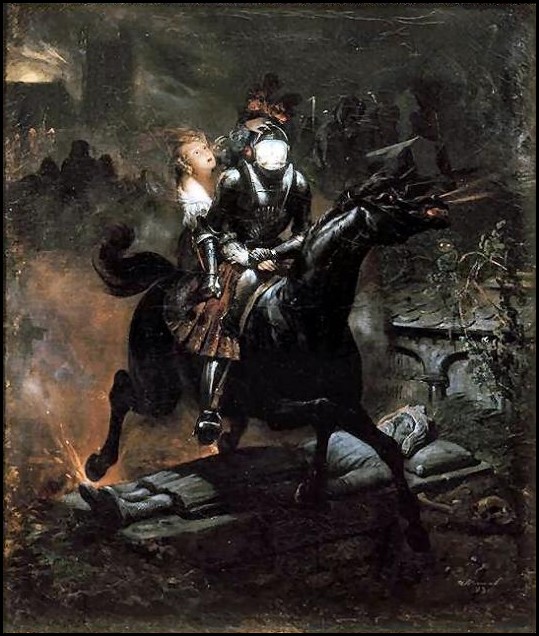
Look up, look up, and airy crewe
In roundel daunces reele:
The moone is bryghte, and blue the nyghte,
Mayst dimlie see them wheele.
Come to, some to, ye gostlie crew,
Come to, and follow mee,
And daunce for us the wedding daunce,
When we in bed shall be.”
And brush, brush, brush, the gostlie crew
Come wheeling ore their heads,
All rustling like the wither’d leaves
That wyde the whirlwind spreads.
Halloo! halloo! away they go,
Unheeding wet or dry;
And horse and rider snort and blowe,
And sparkling pebbles flye.
And all that in the moonshyne lay,
Behynde them fled afar;
And backwarde scudded overhead
The sky and every star.
Tramp, tramp, across the lande they speede;
Splash, splash, across the see:
“Hurrah! the dead can ride apace;
Dost fear to ride with me?
I weene the cock prepares to crowe;
The sand will soone be runne:
I snuffe the earlye morning aire;
Downe, downe! our worke is done.

The dead, the dead can ryde apace;
Oure wed-bed here is fit:
Our race is ridde, oure journey ore,
Our endlesse union knit.”
And lo! an yren-grated grate
Soon biggens to their viewe:
He crackte his whyppe; the clangynge boltes,
The doores asunder stewe.
They pass, and ’twas on graves they trode;
“’Tis hither we are bounde:”
And many a tombstone gostlie white
Lay inn the moonshyne round.
And when hee from his steede alytte,
His armour, black as cinder,
Did moulder, moulder all awaye,
As were it made of tinder.
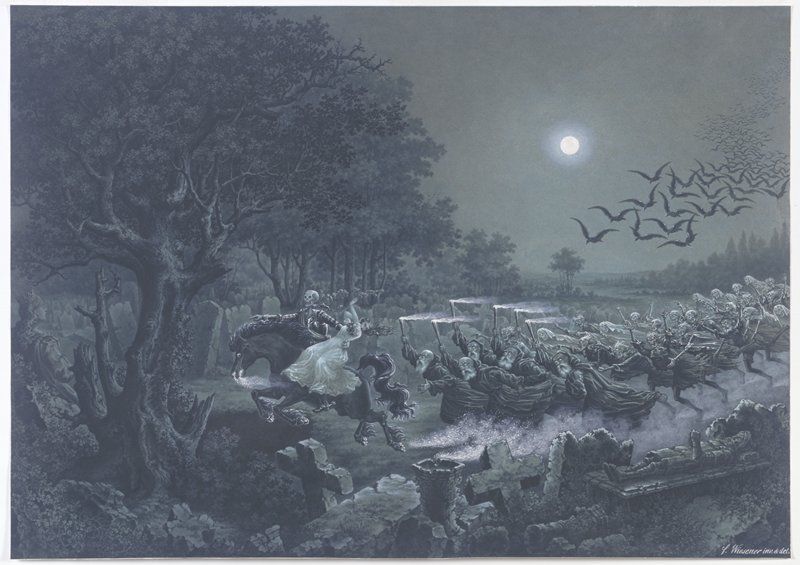
His head became a naked skull;
Nor haire nor eyne had hee:
His body grew a skeleton,
Whilome so blythe of blee.
And att his dry and boney heele
No spur was left to be;
And inn his witherde hande you might
The scythe and hour-glasse see.
And lo! his steede did thin to smoke,
And charnel fires outbreathe;
And pal’d, and bleach’d, then vanish’d quite
The mayde from underneathe.
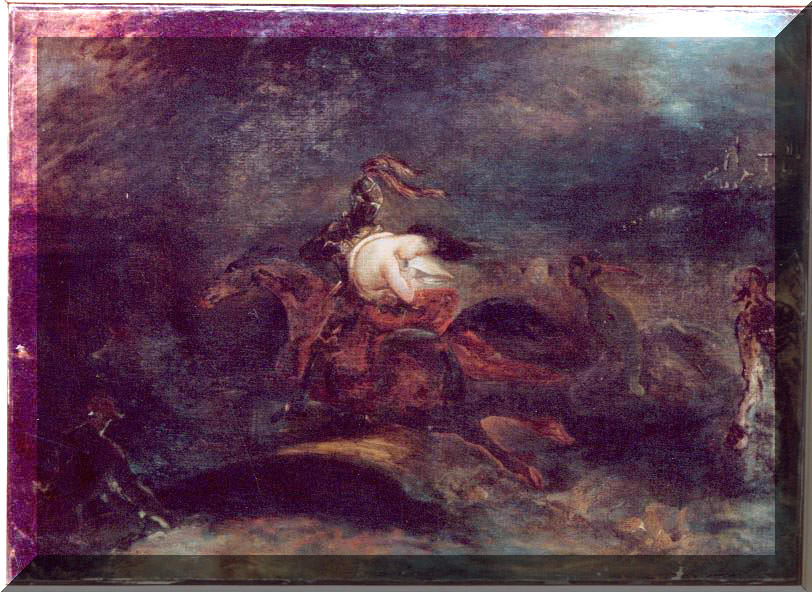
And hollow howlings hung in aire,
And shrekes from vaults arose.
Then knew the mayde she mighte no more
Her living eyes unclose.
But onwarde to the judgement seat,
Thro’ myste and moonlight dreare,
The gostlie crewe their flyghte persewe,
And hollowe inn her eare:–
“Be patient; tho’ thyne herte should breke,
Arrayne not Heven’s decree;
Thou nowe art of thie bodie refte,
Thie soule forgiven bee!”
For the translation by Dante Gabriel Rossetti go here: http://www.simplysupernatural-vampire.com/vampire-poem-lenora.html

Lenore
Lenore fuhr ums Morgenrot
Empor aus schweren Träumen:
“Bist untreu, Wilhelm, oder tot?
Wie lange willst du säumen” -
Er war mit König Friedrichs Macht
Gezogen in die Prager Schlacht
Und hatte nicht geschrieben,
Ob er gesund geblieben.
Der König und die Kaiserin,
Des langen Haders müde,
Erweichten ihren harten Sinn
Und machten endlich Friede;
Und jedes Heer, mit Sing und Sang,
Mit Paukenschlag und Kling und Klang,
Geschmückt mit grünen Reisern,
Zog heim nach seinen Häusern.
Und überall, all überall,
Auf Wegen und auf Stegen,
Zog Alt und Jung dem Jubelschall
Der Kommenden entgegen.
“Gottlob” rief Kind und Gattin laut,
“Willkommen!” manche frohe Braut;
Ach! aber für Lenoren
War Gruß und Kuß verloren.
Sie frug den Zug wohl auf und ab
Und frug nach allen Namen;
Doch keiner war, der Kundschaft gab,
Von allen, so da kamen.
Als nun das Heer vorüber war,
Zerraufte sie ihr Rabenhaar
Und warf sich hin zur Erde
Mit wütiger Gebärde.
Die Mutter lief wohl hin zu ihr:
“Ach, daß sich Gott erbarme!
Du liebes Kind! was ist mit dir?”
Und schloß sie in die Arme. –
“O Mutter! Mutter! hin ist hin!
Nun fahre Welt und alles hin!
Bei Gott ist kein Erbarmen:
O weh, o weh mir Armen!” -
“Hilf Gott! hilf! Sieh uns gnädig an!
Kind, bet ein Vaterunser!
Was Gott tut, das ist wohlgetan,
Gott, Gott erbarm sich unser!” - .
“O Mutter! Mutter! eitler Wahn!
Gott hat an mir nicht wohlgetan!
Was half, was half mein Beten?
Nun ists nicht mehr vonnöten.” -
“Hilf Gott! hilf! Wer den Vater kennt,
Der weiß, er hilft den Kindern.
Das hochgelobte Sakrament
Wird deinen Jammer lindern.” -
“O Mutter! Mutter! was mich brennt,
Das lindert mir kein Sakrament,
Kein Sakrament mag Leben
Den Toten wiedergeben.” -
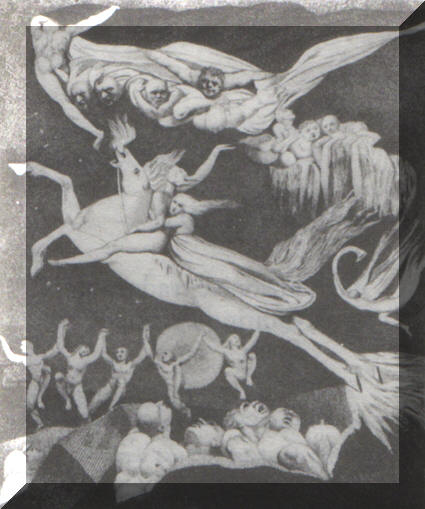
“Hör, Kind! Wie, wenn der falsche Mann
Im fernen Ungerlande
Sich seines Glaubens abgetan
Zum neuen Ehebande? —
Laß fahren, Kind, sein Herz dahin!
Er hat es nimmermehr Gewinn!
Wann Seel und Leib sich trennen,
Wird ihn sein Meineid brennen!” -
“O Mutter! Mutter! hin ist hin!
Verloren ist verloren!
Der Tod, der Tod ist mein Gewinn!
O wär ich nie geboren! –
Lisch aus, mein Licht! auf ewig aus!
Stirb hin! stirb hin! in Nacht und Graus!
Bei Gott ist kein Erbarmen:
O weh, o weh mir Armen!” -
“Hilf Gott! hilf! Geh nicht ins Gericht
Mit deinem armen Kinde!
Sie weiß nicht, was die Zunge spricht;
Behalt ihr nicht die Sünde! –
Ach, Kind! vergiß dein irdisch Leid
Und denk an Gott und Seligkeit,
So wird doch deiner Seelen
Der Bräutigam nicht fehlen.” -
“O Mutter! was ist Seligkeit?
O Mutter! was ist Hölle?
Bei ihm, bei ihm ist Seligkeit,
Und ohne Wilhelm, Hölle!
Lisch aus, mein Licht! auf ewig aus!
Stirb hin! stirb hin! in Nacht und Graus!
Ohn ihn mag ich auf Erden,
Mag dort nicht selig werden.” –
So wütete Verzweifelung
Ihr in Gehirn und Adern.
Sie fuhr mit Gottes Vorsehung
Vermessen fort zu hadern,
Zerschlug den Busen und zerrang
Die Hand bis Sonnenuntergang,
Bis auf am Himmelsbogen
Die goldnen Sterne zogen.

Und außen, horch, gings trap trap trap,
Als wie von Rosses Hufen,
Und klirrend stieg ein Reiter ab
An des Geländers Stufen.
Und horch! und horch! den Pfortenring
Ganz lose, leise klinglingling!
Dann kamen durch die Pforte
Vernehmlich diese Worte:
“Holla ! holla ! Tu auf, mein Kind!
Schläfst, Liebchen, oder wachst du?
Wie bist noch gegen mich gesinnt?
Und weinest oder lachst du?” -
“Ach, Wilhelm! du? - So spät bei Nacht?
Geweinet hab ich und gewacht;
Ach, großes Leid erlitten!
Wo kommst du her geritten?” -
“Wir satteln nur um Mitternacht.
Weit ritt ich her von Böhmen;
Ich habe spät mich aufgemacht
Und will dich mit mir nehmen.” -
“Ach, Wilhelm, ‘rein, herein geschwind!
Den Hagedorn durchsaust der Wind:
Herein, in meinen Armen,
Herzliebster, zu erwarmen!” -
“Laß sausen durch den Hagedorn,
Laß sausen, Kind, laß sausen!
Der Rappe scharrt; es klirrt der Sporn!
Ich darf allhier nicht hausen!
Komm, schürze, spring und schwinge dich
Auf meinen Rappen hinter mich!
Muß heut noch hundert Meilen
Mit dir ins Brautbett eilen.” -
“Ach, wolltest hundert Meilen noch
Mich heut ins Brautbett tragen?
Und horch! es brummt die Glocke noch,
Die elf schon angeschlagen” -
“Herzliebchen! komm! der Mond scheint hell;
Wir und die Toten reiten schnell;
Ich bringe dich, zur Wette,
Noch heut ins Hochzeitsbette.” -
“Sag an ! wo ist dein Kämmerlein?
Wo? wie dein Hochzeitsbettchen?” -
“Weit, weit von hier! - Still, kühl und klein!
Sechs Bretter und zwei Brettchen!” -
“Hats Raum für mich?” - “Für dich und mich!
Komm, schürze, spring und schwinge dich!
Die Hochzeitsgäste hoffen;
Die Kammer steht uns offen.”

Schön Liebchen schürzte, sprang und schwang
Sich auf das Roß behende;
Wohl um den trauten Reiter schlang
Sie ihre Lilienhände;
Und als sie saßen, hopp hopp hopp!
Gings fort im sausenden Galopp,
Daß Roß und Reiter schnoben
Und Kies und Funken stoben.
Zur rechten und zur linken Hand,
Vorbei vor ihren Blicken,
Wie flogen Anger, Heid und Land!
Wie donnerten die Brücken!
“Graut Liebchen auch? …Der Mond scheint hell!
Hurra! Die Toten reiten schnell!
Graut Liebchen auch vor Toten?” -
“Ach nein! …doch laß die Toten!” -
Was klang dort für Gesang und Klang?
Was flatterten die Raben? …
Horch Glockenklang! Horch Totensang:
“Laßt uns den Leib begraben !”
Und näher zog ein Leichenzug,
Der Sarg und Totenbahre trug.
Das Lied war zu vergleichen
Dem Unkenruf in Teichen.
“Nach Mitternacht begrabt den Leib
Mit Klang und Sang und Klage!
Jetzt führ ich heim mein junges Weib;
Mit, mit zum Brautgelage! …
Komm, Küster, hier! komm mit dem Chor
Und gurgle mir das Brautlied vor!
Komm, Pfaff, und sprich den Segen,
Eh wir zu Bett uns legen!”
Still Klang und Sang. - Die Bahre schwand. –
Gehorsam seinem Rufen
Kams, hurre! hurre! nachgerannt
Hart hinter’s Rappen Hufen.
Und immer weiter, hopp! hopp! hopp!
Gings fort im sausenden Galopp,
Daß Roß und Reiter schnoben
Und Kies und Funken stoben.
Wie flogen rechts. wie flogen links
Gebirge, Bäum und Hecken!
Wie flogen links und rechts und links
Die Dörfer, Städt und Flecken! -
“Graut Liebchen auch? …Der Mond scheint hell!
Hurra! Die Toten reiten schnell!
Graut Liebchen auch vor Toten?”
“Ach. laß sie ruhn, die Toten.” -
Sieh da ! sieh da ! Am Hochgericht
Tanzt, um des Rades Spindel,
Halb sichtbarlich. bei Mondenlicht,
Ein luftiges Gesindel.
“Sa ! sa ! Gesindel! hier! komm hier!
Gesindel, komm und folge mir!
Tanz uns den Hochzeitsreigen,
Wann wir das Bett besteigen!” -
Und das Gesindel, husch! husch! husch!
Kam hinten nach geprasselt,
Wie Wirbelwind am Haselbusch
Durch dürre Blätter rasselt.
Und weiter, weiter, hopp! hopp! hopp!
Gings fort im sausenden Galopp,
Daß Roß und Reiter schnoben
Und Kies und Funken stoben.
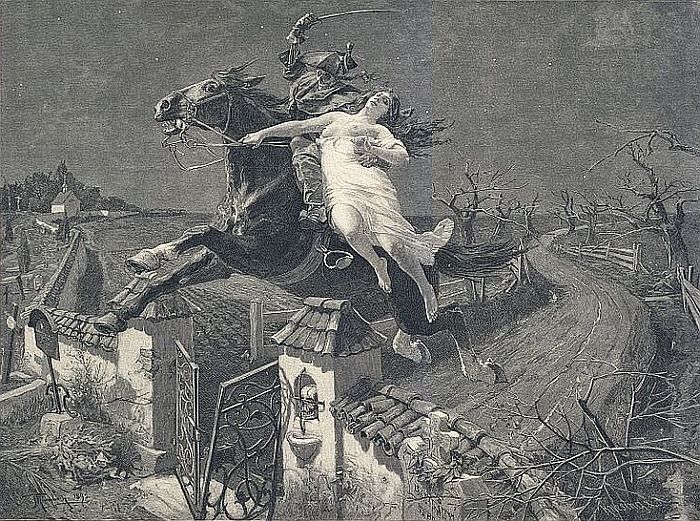
Wie flog, was rund der Mond beschien,
Wie flog es in die Ferne!
Wie flogen oben überhin
Der Himmel und die Sterne! -
“Graut Liebchen auch? …Der Mond scheint hell!
Hurra! Die Toten reiten schnell! –
Graut Liebchen auch vor Toten?”
“O weh! laß ruhn die Toten!”
“Rapp! Rapp! Mich dünkt, der Hahn schon ruft. –
Bald wird der Sand verrinnen. -
Rapp! Rapp! ich wittre Morgenluft -
Rapp! tummle dich von hinnen!-
Vollbracht! vollbracht ist unser Lauf!
Das Hochzeitsbette tut sich auf!
Die Toten reiten schnelle!
Wir sind, wir sind zur Stelle!”
Rasch auf ein eisern Gittertor
Gings mit verhängtem Zügel;
Mit schwanker Gert ein Schlag davor
Zersprengte Schloß und Riegel.
Die Flügel flogen klirrend auf,
Und über Gräber ging der Lauf;
Es blinkten Leichensteine
Ringsum im Mondenscheine.
Ha sieh! Ha sieh ! im Augenblick,
Hu! Hu! ein gräßlich Wunder!
Des Reiters Koller, Stück für Stück,
Fiel ab, wie mürber Zunder.
Zum Schädel ohne Zopf und Schopf,
Zum nackten Schädel ward sein Kopf,
Sein Körper zum Gerippe
Mit Stundenglas und Hippe.
Hoch bäumte sich, wild schnob der Rapp
Und sprühte Feuerfunken;
Und hui ! wars unter ihr hinab
Verschwunden und versunken.
Geheul! Geheul aus hoher Luft,
Gewinsel kam aus tiefer Gruft;
Lenorens Herz mit Beben
Rang zwischen Tod und Leben.
Nun tanzten wohl bei Mondenglanz
Rund um herum im Kreise
Die Geister einen Kettentanz
Und heulten diese Weise:
“Geduld! Geduld! wenns Herz auch bricht!
Mit Gott im Himmel hadre nicht!
Des Leibes bist du ledig;
Gott sei der Seele gnädig!”

 Theme
Theme